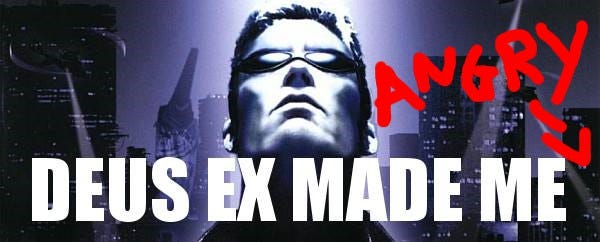Tom Chick: The Man Who Hated Deus Ex
When Deus Ex debuted back in 2000 it was showered with universal critical kudos. Well... almost universal critical kudos. The exception was Tom Chick, now one of the most respected American games journalists currently writing about the medium, who gave it a sub-50% mark. And no-one's ever forgot it, though it's long since been lost even to archive.org... though the lovely Crumbsucker has unearthed it. I felt I couldn't finish our looking-backwards at Deus Ex without talking to Tom about his infamous running-joke provoking review...
RPS: Care to tell about the back story, as far as you remember? As in, how did you come to be reviewing this game?
Tom Chick: I was a freelancer for cnet's Gamecenter. It was just another assignment. They would say, "Hey, can you review this game?" and as long as it wasn't something about sports, I'd say "Sure".
RPS: What were your expectations before going in? What was that initial impression?
Tom Chick: Ah, that was when the internet was young and inchoate and jealous of print publications and full of wide open space that would eventually get clogged up with previews, message boards, and comments sections. I don't recall having much by way of expectations for Deus Ex. I knew it was associated with Ion Storm's shenanigans in Texas. I knew Warren Spector had a history at Origin and Looking Glass. Beyond that, I recall going in naked.
RPS: So, you wrote the review. Were you aware at the time it was going to be controversial? I can't remember when it came it the review cycle, so did you know you were going against the flow?
Tom Chick: I had no idea. I never do. I'm a bit oblivious that way. I simply write about my experience. Sometimes some cosmic dice roll and my experience is out of sorts with everyone else's experiences. I had played through a review build before Deus Ex was released, so my first inkling that my experience was a snake eyes or box cars was when my editor emailed me after I'd submitted the review. He said everyone at Gamecenter liked Deus Ex so they weren't going to run the review. He reassigned it to someone else. They never offered me another assignment after that.
By the way, before submitting the review, I doublechecked with my editor about review scores. Gamecenter was using the 1-10 scale. Not the 7-9 scale, they insisted! Even back then, I resisted the idea of the 1-10 scale being a 7-9 scale (that particular battle has long since been lost, of course). So while writing the Deus Ex review, I verified with my editor that a 5 would be an average game and not necessarily a negative score. He confirmed. So I sent in the Deus Ex review with a 3. I figured it was a couple notches below average. Man, can you imagine a 3 these days? No one's going to use a 3 on any game that doesn't cost $19.99 or less.
So Gamecenter killed the review and I sold it to Games Domain. One of the cool things about the internet back then was that there were about a zillion places where a freelancer could sell an article. Games Domain stuck a bunch of Beatle's lyrics into the review as subheads, which was a bit mystifying to me. But otherwise, they graciously published almost exactly what I'd submitted.
I guess it wasn't until after it was published that I realized how the cosmic dice had rolled on a larger scale. I remember several long and often acrimonious conversations on Usenet about the review. And, of course, the emails. For a while, I had a whole folder for Deus Ex email. Some emails were supportive, but most were just people who wanted to vent. One angry fellow – he was a kid really – sent me a picture of himself, pointing a gun at the camera. He wrote something like "go ahead, make my day" in the email. I suppose that could be considered a death threat, but I would have preferred something more dramatic like "I will totally kill you because you didn’t like Deus Ex!" I tried for a while to respond to everyone as graciously as I could, but I eventually petered out. So if you wrote me an angry email ten years ago, I apologize for not getting back to you.
RPS: Have you re-read it recently? What do you think with it? Oddly, it's a review which has tended to stick in my head. The "This is how the world ends" bit nailing the quotations was a fine flourish. And I also specifically remember that your reservations weren't actually easy to dismiss - a world where every corner contains 10mm ammo and all that. For all the bile, no-one's really found a problem in the review.
Tom Chick: I don't know about you, but I hate going back and reading my old stuff. However, I wrote an updated look at Deus Ex for Gametap recently. So I actually re-read the review and then replayed parts of Deus Ex. I still didn't care for it, but it was nice to see the engine running smoothly. That was one of my major criticisms. When Deus Ex was released, the Unreal engine struggled mightily with the level design. That was before console systems came along and saved us all from poorly optimized engines.
Deus Ex does deserve credit for trying open-world-ish games before they were really ready. A year before Grand Theft Auto III came along, Ion Storm was trying to drop you into Paris and Hong Kong. That was pretty ballsy, even if there was a curfew or plague or whatever to limit the number of characters onscreen at once. But Ion Storm was biting off way more than they could chew with that graphics engine and particularly with that AI [sic]. Those things just killed the experience for me. Contrast this to Alpha Protocol, which focuses first and foremost on gameplay, confined to smaller more manageable boxes representing warehouses or enemy bases. For all its faults, Alpha Protocol knows how far it can and can't reach.
RPS: How do you feel about its graduation into a running joke?
Tom Chick: It's sort of cute. We all have strong opinions about different things, and I'm lucky enough that some of those make an impression on people, for better or worse. But I do wish the reaction was to wonder *why* I didn't like Deus Ex. Instead, it's often just shorthand to dismiss something else I've written. "Oh, he didn't like Mass Effect 2? Well, he didn't like Deus Ex either!" That's just lazy and it ultimately hurts the level of discourse when we talk about videogames.
For instance, if I hear that someone doesn't like Casablanca or Jaws or Moon, I want to know *why* he didn't like it. Those are interesting conversations and at their best, we each learn something, even if it's just about each other. But unfortunately, those are conversations missing in the internet videogame culture. People tend to judge opinions based not on their insight, but on whether they agree with that opinion. A good review isn't a good review. It's a review you agree with.
RPS: Part of me wonders what it'd be like to drop a review like that nowadays. As in, that was an earlier time of the Internet. It was quieter. Seeing the death threats that a peer of mine got for 8/10ing MGS4, I'd be fearing for my life. Thoughts?
Some games have built-in fans who like to vent. And that's cool. I've run into that a fair bit when I've been critical of Playstation exclusives like Killzone 2 and Uncharted 2. Nintendo has its defenders, but they don't have that siege mentality. I wrote a negative review of Metal Gear Solid 4, but began with the premise that the game was mostly fan service, which might have deflected the death threats to your buddy who gave it an 8.
However, I think it's important to look at that sort of anger as a sort of immaturity, a fundamental insecurity about your own opinion, about being unable to express it without simply being emphatic. It's a defensive measure more than anything else. If reviewers want to address this – and I feel we should since it permeates the way people talk about videogames – the best we can do is explain ourselves in such a way as to work around that defensiveness. It's important that we're articulate, that we give context, that we talk specifics as much as we can, that we avoid lazy comments and clichés and hyperbole, that we're willing to have conversations.
By the way, ratings systems are an obstacle to all of that, but that's a whole other conversation.
RPS: Actually, it strikes me that Deus Ex was actually quite an important review for you, in terms of cementing your name and approach. You're one of the few American reviewer who I've felt most likely to go against the critical grain if he feels like it, whether positively or negatively. As in, if you're willing to come out against Deus Ex, you'll be willing to damn or praise pretty much anything, in a direct way. Or is that just me?
Tom Chick: You just slammed America, didn't you? I can't believe you guys are still smarting about that War of Independence thing. However, my approach hasn't changed one whit since my very first review. It was of a submarine sim way back in, gosh, 1990 or something. Critical grain should have no bearing on a review, mainly because there are so many more meaningful things to take into account.
By the way, I met Harvey Smith at a Midway press event several years ago. I have a lot of respect for him. He's a smart, thoughtful, articulate guy. I got to talk to him a bit and he said the guys at Ion Storm were mystified that I could be so critical about Deus Ex, but then I'd write something enthusiastic about some monster truck racing game. Which is a fair point, but I countered that different games have different objectives. Ion Storm was ambitious with Deus Ex in a way that a monster truck game isn't. We should consider Deus Ex with very different criteria than a monster truck game.
Also, I have no idea what monster truck racing game he's talking about. Did I really write a positive review of a monster truck game? Oh dear.
RPS: Thanks for your time.
Tom runs Syfy's games blog, Fidgit. He regularly links to his other work on his Quarter To Three forum.









